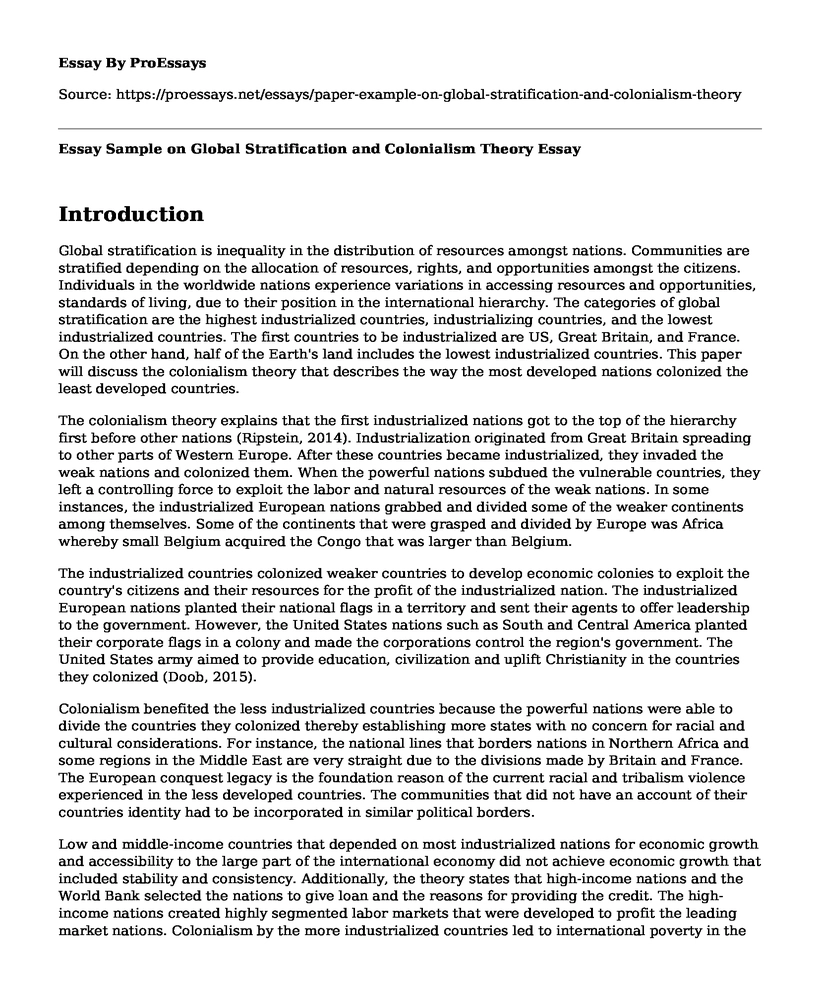Introduction
Global stratification is inequality in the distribution of resources amongst nations. Communities are stratified depending on the allocation of resources, rights, and opportunities amongst the citizens. Individuals in the worldwide nations experience variations in accessing resources and opportunities, standards of living, due to their position in the international hierarchy. The categories of global stratification are the highest industrialized countries, industrializing countries, and the lowest industrialized countries. The first countries to be industrialized are US, Great Britain, and France. On the other hand, half of the Earth's land includes the lowest industrialized countries. This paper will discuss the colonialism theory that describes the way the most developed nations colonized the least developed countries.
The colonialism theory explains that the first industrialized nations got to the top of the hierarchy first before other nations (Ripstein, 2014). Industrialization originated from Great Britain spreading to other parts of Western Europe. After these countries became industrialized, they invaded the weak nations and colonized them. When the powerful nations subdued the vulnerable countries, they left a controlling force to exploit the labor and natural resources of the weak nations. In some instances, the industrialized European nations grabbed and divided some of the weaker continents among themselves. Some of the continents that were grasped and divided by Europe was Africa whereby small Belgium acquired the Congo that was larger than Belgium.
The industrialized countries colonized weaker countries to develop economic colonies to exploit the country's citizens and their resources for the profit of the industrialized nation. The industrialized European nations planted their national flags in a territory and sent their agents to offer leadership to the government. However, the United States nations such as South and Central America planted their corporate flags in a colony and made the corporations control the region's government. The United States army aimed to provide education, civilization and uplift Christianity in the countries they colonized (Doob, 2015).
Colonialism benefited the less industrialized countries because the powerful nations were able to divide the countries they colonized thereby establishing more states with no concern for racial and cultural considerations. For instance, the national lines that borders nations in Northern Africa and some regions in the Middle East are very straight due to the divisions made by Britain and France. The European conquest legacy is the foundation reason of the current racial and tribalism violence experienced in the less developed countries. The communities that did not have an account of their countries identity had to be incorporated in similar political borders.
Low and middle-income countries that depended on most industrialized nations for economic growth and accessibility to the large part of the international economy did not achieve economic growth that included stability and consistency. Additionally, the theory states that high-income nations and the World Bank selected the nations to give loan and the reasons for providing the credit. The high-income nations created highly segmented labor markets that were developed to profit the leading market nations. Colonialism by the more industrialized countries led to international poverty in the countries they colonized. The theory states that high-income nations would not be as productive as they currently are if they lacked the resources that they loaned to the low and medium-income countries. The vital way to reverse global inequality is through relieving previous colonizers of the low and medium countries' debts for them to profit from their individual's firms and resources (Smith, 2016).
Work Cited
Doob, Christopher. "Social Inequality and Social Stratification in U.S. Society." 2015, doi:10.4324/9781315662800.
Ripstein, Arthur. "Kant's Juridical Theory of Colonialism." Kant and Colonialism, 2014, pp. 145-169., doi:10.1093/acprof:oso/9780199669622.003.0007.
Smith, Woodruff D. "Contexts of Colonialism." History and Theory, 2016, PP 290-301. Web.
Cite this page
Essay Sample on Global Stratification and Colonialism Theory. (2022, Oct 20). Retrieved from https://proessays.net/essays/paper-example-on-global-stratification-and-colonialism-theory
If you are the original author of this essay and no longer wish to have it published on the ProEssays website, please click below to request its removal:
- Essay Example on John Luther Martin: Composing the Beauty of the Desert
- Annotated Bibliography on Mexican Drug Cartels: Thriving Despite Security Measures
- Essay on US Govt's WWII Decision to Draft Japanese-Americans: Justified?
- African Assertions of Equality & Tocqueville's Links to American Democracy - Essay Sample
- Essay Example on US-North Korea Relations Deteriorate: Nuclear Weapons & Missile Developments
- Popular Sovereignty: The Texas Revolution and Its Voters - Free Essay
- Essay on Benjamin Netanyahu's Leadership in the Israeli Parliamentary System: Overcoming Perils of Presidentialism







